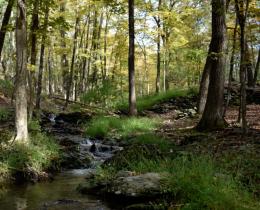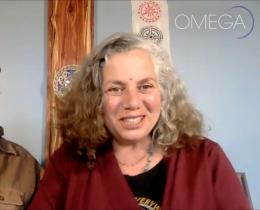Omega: In your talk, you said, “We’ve built our economy around a metaphor that has more to do with the Cold War than with life.” Can you explain what you meant?
Janine: When ecology as a science started a century ago there were two gentleman, Fredric Clements and Henry Gleason. They presented opposing viewpoints.
Frederic Clements said that ecosystems are communities. They organize themselves and are actually giving each other mutual aid. They actually create conditions that are more and more conducive to their living together.
Henry Gleason said, "No; absolutely not." Ecosystems are actually just individuals that are simply responding to the conditions to the soil type, to the kind of water on that site, to the slope. They seem to look like they’re in a community, but there’s no such thing.
Until recently, Gleason had won this great debate.
What happened was, most of the science would look at interaction amongst plants saying, "They’re actually fighting for sunlight; they’re fighting for water; they’re fighting for space; they’re fighting for soil nutrients. They’re spacing themselves out in this competitive way, but they’re really just individuals.”
We spent 100 years and a lot of research looking for the data that would say, “Yeah. That explains it.” Well, we couldn’t quite find it. Certainly there was some competition going on, but was it the driving factor? Competition wasn’t the whole story.
This was all going on at the time of the Cold War. So anything that smacked of communism went against our economy paradigm, which was saying, “Dog-eat-dog competition is the way the natural world works.”
Ten or fifteen years ago you had this group of scientists who said, “You know we’ve been doing these studies and it turns out that mutualistic relationships are much more common, and have more ecological significance than we thought."
We didn’t know at that time, for instance, that mycorrhizal fungi basically wrap around roots and help a plant or a tree get phosphorus, and the plant or tree gives the fungi carbon. We didn’t realize until very recently that not only do these mycorrhizal fungi help a plant or tree get phosphorus, but that the same mycorrhizal fungi will go to the tree next door and wrap around its roots, and then it will go to the shrub. We do now. We have this evidence.
Since then, mutualism science has really risen and so has facilitation science. So, luckily the people in these fields (ecology, evolutionary, and biology) are now basically saying, “We cannot ignore mutualisms or facilitations."
Omega: In your talk, you said the pesticides of the future won’t be chemical pesticides, but “helping the helpers.” What does that mean?
Janine: It's really a biomimetic way of looking at how to manage pests. That’s what organisms do. They don’t eliminate pests, they manage them.
What we will do is look to plants that are not really suffering as a result of pests or they have a low level of pests and say, “Gosh, how are you doing that?” Now what we’re increasingly saying is, “Let’s look at the soil around your roots.” What we find there is a whole community of organisms, fungi, and bacteria who are called in by the plant. They actually are helping to protect the plant from root diseases; they’re also helping to turn on certain plant defenses.
In the future I think that we’re really talking about how do we steward soil, how do we steward the microbial community at the root level? You may just simply be helping to create the conditions conducive to those helpers. Maybe you help by increasing the alkalinity of the soil or whatever. What it’s going to be is allowing plants to have access to these microbial helpers. The plants will call them in.
Omega: You described an experiment in which you ask people to go into the woods, sit there, observe, and let nature come to them. It seems the same exercise could have been written by a meditation teacher. Do you actually have a meditation practice?
Janine: I don’t sit on a cushion, but every opportunity I can, I put myself in the presence of the natural world, give myself up to it and try to get out of the way.
I try to quiet my own cleverness when I’m outside. I live surrounded by a lot of beauty. So I leave the house a lot during the day. I usually go out to have a phone call. Then I turn off the phone and I wind up staring into the pond, where I lose myself. I’m not there. It’s not interior really but I’m not thinking. I am allowing. I love letting those organisms come to me. If I sit quietly enough and I just become part of the scenery they’ll start to come to me. I don’t know whether that’s meditation. I just know that I’m very refreshed after 15 minutes of that.
The thing is to listen, to observe, without hunting. When I’m hunting for something, I’ll never be surprised. But If I sit and not have a preconceived notion about what I’m going to see, that is I don’t create a hypothesis, I’m surprised. And I like to be surprised. There’s a lot more joy in just going in without a preconceived expectation of what would be delightful. Nature will always be more delightful than you could of possibly imagined.



